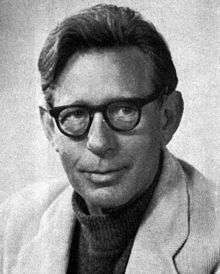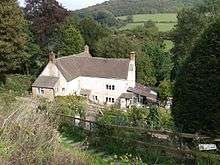Laurie Lee
| Laurie Lee | |
|---|---|
 | |
| Born |
26 June 1914 Stroud, Gloucestershire, England, United Kingdom |
| Died |
13 May 1997 (aged 82) Slad, Gloucestershire, England, United Kingdom |
| Occupation | Author, screenwriter, poet |
Laurence Edward Alan "Laurie" Lee, MBE (26 June 1914 – 13 May 1997) was an English poet, novelist and screenwriter, who was brought up in the village of Slad and went to the Central Boys' School, Stroud, Gloucestershire.[1] His most famous work was an autobiographical trilogy which consisted of Cider with Rosie (1959), As I Walked Out One Midsummer Morning (1969) and A Moment of War (1991). The first volume recounts his childhood in the Slad Valley. The second deals with his leaving home for London and his first visit to Spain in 1935, and the third with his return to Spain in December 1937 to join the Republican International Brigades.
Early life and works

Having been born in Stroud on 26 June 1914, Lawrence Edward Alan Lee moved with his family to the village of Slad in 1917, the move with which Cider with Rosie opens. After fighting in the First World War with the Royal West Kent Regiment, Lee's father, Reginald Joseph Lee, did not return to the family. Lee and his brothers grew up loving their mother's (Annie Emily Light) family, the Lights, and intensely disliking the Lee side. His sister, Frances Nemariah Joan Lee died in September 1915 aged 3 when Lawrence Lee was a toddler. He had older siblings from his father's first marriage, including Dorothy, Phyllis and Marjorie. His brother Jack Lee (born 1913) was to become a film director.
At 12, Lee went to the Central Boys' School in Stroud. In his notebook for 1928, when he was 14 he listed "Concert and Dance Appointments", for at this time he was in demand to play his violin at dances.
He left the Central School at 15 to become an errand boy at a Chartered Accountants in Stroud. In 1931 he first found the Whiteway Colony, two miles from Slad, a colony founded by Tolstoyan anarchists. It gave him his first smattering of politicisation and was where he met the composer Benjamin Frankel and the "Cleo" who appears in As I Walked Out One Midsummer Morning.[2] In 1933 he met Sophia Rogers, an "exotically pretty girl with dark curly hair" who had moved to Slad from Buenos Aires, an influence on Lee who said later in life that he only went to Spain because "a girl in Slad from Buenos Aires taught me a few words of Spanish."
At 20 he worked as an office clerk and a builder's labourer, and lived in London for a year before leaving for Vigo, in northwest Spain, in the summer of 1935. From there he travelled across Spain as far as Almuñecar on the coast of Andalusia. Walking more often than not, he eked out a living by playing his violin.[1] His first encounter with Spain is the subject of As I Walked Out One Midsummer Morning (1969).
After the outbreak of the Spanish Civil War in July 1936 Lee was picked up by a British destroyer from Gibraltar that was collecting marooned British subjects on the southern Spanish coast. During this period, he met a woman who supported him financially. He started to study for an art degree but returned to Spain in 1937 as an International Brigade volunteer. His service in the Brigade was cut short by his epilepsy. These experiences were recounted in A Moment of War (1991), an austere memoir of his time as a volunteer in the Spanish Civil War (1936–39). According to many biographical sources, Lee fought in the Republican army against Franco's Nationalists. After his death there were claims that Lee's involvement in the war was a fantasy; the claims were dismissed as "ludicrous" by his widow.[3]
Before 1951, Lee worked primarily as a journalist and as a scriptwriter. During World War II he made documentary films for the GPO Film Unit (1939–40) and the Crown Film Unit (1941–43). From 1944 to 1946 he worked as the Publications Editor for the Ministry of Information.[4] In 1950 Lee married Catherine Francesca Polge, whose father was Provençal and whose mother was one of the Garman sisters; they had one daughter, Jessie. From 1950 to 1951 he was caption-writer-in-chief for the Festival of Britain, for which service he was made a Member of the Order of the British Empire in 1952.[5]
The success of the autobiographical novel Cider with Rosie in 1959 allowed Lee to become a full-time independent writer. It continues to be one of the UK's most popular books, and is often used as a set English literature text for schoolchildren. The work depicts the hardships, pleasures and simplicity of rural life in the time of Lee's youth; readers continue to find the author's portrayal of his early life vivid and evocative. Lee said that creation of the book took him two years, and that it was written three times. With the proceeds Lee was able to buy a cottage in Slad, the village of his childhood.
Poetry
Lee's first love was always poetry, though he was only moderately successful as a poet. Lee's first poem appeared in the Sunday Referee in 1934.[6] Another poem was published in Cyril Connolly's Horizon magazine in 1940 and his first volume of poems, The Sun My Monument, was launched in 1944. This was followed by The Bloom of Candles (1947) and My Many-coated Man (1955). Several poems written in the early 1940s reflect the atmosphere of the war, but also capture the beauty of the English countryside. The poem "Twelfth Night" from My Many-coated Man was set for unaccompanied mixed choir by American composer Samuel Barber in 1968.
Other works
Other works include A Rose for Winter, about a trip he made to Andalusia 15 years after the civil war; Two Women (1983), a story of Lee's courtship and marriage with Kathy, daughter of Helen Garman; The Firstborn (1964), about the birth and childhood of their daughter Jessie; and I Can't Stay Long (1975), a collection of occasional writing.
Lee also wrote travel books, essays, a radio play and short stories.
Honours and awards
Lee received several awards, including the Atlantic Award (1944), the Society of Authors travelling award (1951), the William Foyle Poetry Prize (1956) and the W.H. Smith and Son Award (1960).
In As I Walked Out One Midsummer Morning, Lee writes of his stay in Almuñécar, a Spanish fishing village which he calls "Castillo". In 1988 the citizens of Almuñécar erected a statue in Lee's honour.[4]
In 1993, A Moment of War was chosen as a Notable Book of the Year by the editors of the New York Times Book Review.[4]
Lee provided a great deal of valuable support to the Brotherhood of Ruralists in their attempts to establish themselves in the 1970s, and he continued to do so until his death; his essay Understanding the Ruralists opened the Brotherhood's major 1993 retrospective book. Indeed, it was Lee who is said to have given them the name "Ruralists."[7]
In 2003 the British Library acquired Lee's original manuscripts, letters and diaries. The collection includes two unknown plays and drafts of Cider with Rosie, which reveal that early titles for the book were Cider with Poppy, Cider with Daisy and The Abandoned Shade.[8]
Final years

In the 1960s, Laurie Lee and his wife returned to Slad to live near his childhood home, where they remained for the rest of his life. Lee revealed on the BBC1 Wogan show in 1985 that he was frequently asked by children visiting Slad as part of their O-Level study of Cider with Rosie "where Laurie Lee was buried", assuming that the author was dead.
Lee narrated the 1998 television adaptation of Cider with Rosie by Carlton Television, which was first broadcast after his death.
Laurie Lee died in Slad on 13 May 1997, at the age of 82. He is buried in the local churchyard.
Works
Books
- Land at War (1945)
- An Obstinate Exile (1951)
- A Rose for Winter: Travels in Andalusia (1955)
- Man Must Move: The Story of Transport (with David Lambert, 1960); published in the US as The Wonderful World of Transportation (1960) – for children
- The Firstborn (1964)
- I Can't Stay Long (1975)
- Innocence in the Mirror (1978)
- Two Women (1983)
Autobiographical Trilogy
- Cider with Rosie (1959); published in the US as The Edge of Day (1960)
- As I Walked Out One Midsummer Morning (1969)
- A Moment of War (1991)
Poetry
- The Sun My Monument (The Hogarth Press, 1944)
- The Bloom of Candles: Verse from a Poet's Year (John Lehmann, 1947)
- My Many-Coated Man (André Deutsch, 1955)
- Poems (1960)
- Selected Poems (Penguin Books, 1983)
Recordings
- Laurie Lee reading 'Cider with Rosie' complete and unabridged. ISIS audio books 1988. 7 disc set 7 h 55 min
- Laurie Lee Reading His Own Poems (1960), Decca music
- Cider with Rosie (3 LP disc set), 1977.
Plays
- The Voyage of Magellan for Radio (broadcast 1946; published 1948)
- Peasants' Priest (1947)
Screenplays
- Cyprus Is an Island (1946)
- A Tale in a Teacup (1947)
Radio Play
- The Voyage of Magellan (1946)[9]
References
- 1 2 Grove 1999.
- ↑ Grove 1999, p. 26.
- ↑ "Laurie Lee Civil War Lies Claims 'Are Ludicrous'", The Birmingham Post, Highbeam Research, 1 January 1998 External link in
|publisher=(help). - 1 2 3 Lyman, Rick. "Poet Laurie Lee Dies at 82." The New Straits Times, 20 May 1997.
- ↑ Barker, Juliet. "Lee, Laurence Edward Alan". Oxford Dictionary of National Biography (article). Oxford University Press. Retrieved 21 April 2016.
- ↑ Lee, Laurie (1969) "As I Walked Out One Midsummer Morning", London: Andre Deutsch, p. 40.
- ↑ Dunnett, Roderic. "Back to Nature." The Spectator, 20 September 2003.
- ↑ Malvern, Jack. "Cider with Rosie Saved for Nation." TimesOnline, 16 May 2003.
- ↑ "Laurie Lee (1914–1997) – English poet and author", TomFolio Books
Bibliography
- Grove, Valerie (1999), Laurie Lee: The Well-Loved Stranger, New York: Viking.
External links
| Wikiquote has quotations related to: Laurie Lee |
- Lee, Laurie, Laurie Lee 100 (last radio interview), BBC Radio Gloucestershire.
- Lee, Laurie, Christmas Landscape (reading), BBC Radio Three.
- Petri Liukkonen. "Laurie Lee". Books and Writers (kirjasto.sci.fi). Archived from the original on 4 July 2013.
- "In Praise of Childhood", Time (review of Lee's autobiography The Edge of Day), 28 March 1960.
- "Laurie Lee", Encyclopaedia Britannica.